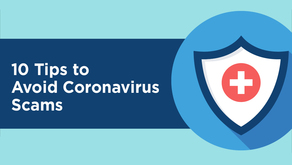It seems like there is a month for everything and cybersecurity is no exception. While protecting our data and finances is an ongoing effort, October is also highlighted as National Cybersecurity Awareness Month, helping to encourage personal accountability and proactive behavior in digital privacy, security best practices and common cyber threats.
Check out the tips below. Pick one or two to improve in your day-to-day habits and Be #CyberSmart!
You can also follow us on Facebook®, Instagram® or Twitter® for additional cybersecurity tips.
- Cybercriminals love it when you overshare on social media – they can learn all about you! Make it harder for their social media scams by not posting real names, places you frequent and home, school and work locations. Your personal information is like money. Be smart about where you're sharing it, who you're sharing it with and how it's being used.
- Browsing on your mobile device? Make sure it's not running suspicious apps or using permissions you didn't realize you approved.
Rules for keeping a high level of mobile device security tabs on your mobile apps:- 1) Delete apps you don’t need or no longer use.
- 2) Review app permissions. Say "No" to any that don't make sense.
- 3) Only download apps from trusted sources.
- P@s$w0rds d0n't hav3 2b th!s Complic@teD! Seriously, who can remember that? Create a strong password by making your password a passphrase. Passphrases should be just like you – fun and unique! Here's an example: "I love my bank and chocolate ice cream!" Sometimes even long and strong passphrases aren’t enough. Step up your game with multi-factor authentication and keep all your private bits…private.
- Play hard to get with strangers to avoid email scams: If you’re unsure who an email is from—even if the details appear accurate—do not respond, and do not click on any links or attachments.
- Stay protected while connected. Any device that connects to the internet is vulnerable to various risks. The best defense is to keep device security software, web browser and operating systems up to date. Public Wi-Fi networks are not secure or safe – limit what you do on public WiFi, and avoid logging in to key accounts like email and financial services. If you must connect, consider using a virtual private network (VPN) or a personal/mobile hotspot. View additional online best practices.
- Limit access to customer data to only the employees who require it to perform core duties of their jobs.
- Cybercriminals cast wide nets with phishing tactics, hoping to drag in victims. They may offer a financial reward, threaten you if you don’t engage, or claim that someone is in need of help. Can you spot a phish? Google's free phishing quiz will test your ability to spot a fake: https://phishingquiz.withgoogle.com/.
Tips for spotting a phish:- 1) They offer financial reward, threaten you or claim to need help.
- 2) They ask for your personal info.
- 3) They want you to download a file or click on a link.




